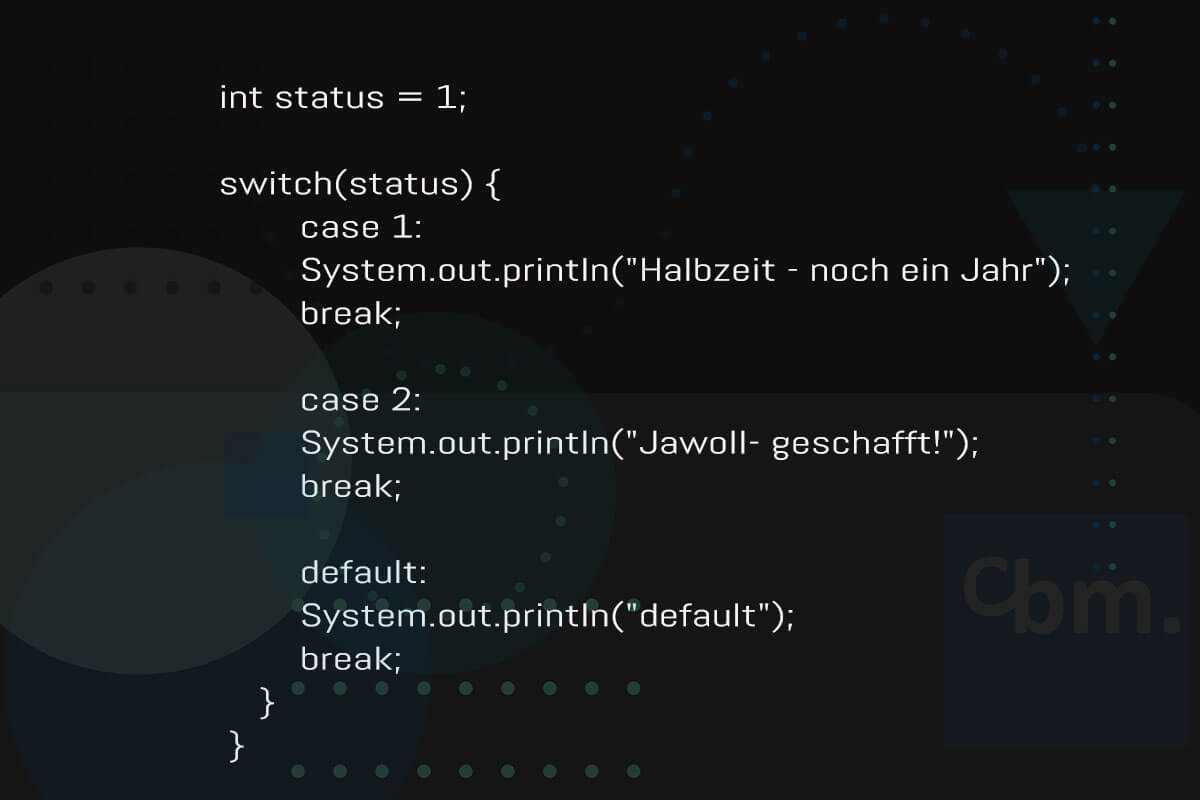Was wird vermittelt?
Grundlagen der Java Programmierung / Einführung in die objektorientierte Programmierung
Für wen ist es geeignet?
Für alle, die im Bereich Anwendungs- und App Entwicklung das internationale Zertifikat „Oracle Certified Associate, Java SE 8 Programmer“ erlangen wollen.
Kurzfristiger Einstieg möglich
Buchen Sie ihr Lerncentermodul in Teilzeit oder Vollzeit nach einer individuellen Beratung. Starten Sie innerhalb von 3 Wochen in Ihre Weiterbildung!
Maßnahmenummern
Vollzeit: 214/550/2023
Teilzeit: 214/423/23
Zugangsvoraussetzung
- PC Kenntnisse, sicherer Umgang mit Programmen und Dateiverwaltung – und Organisation im PC
- Java Basics Kurs
- Sehr gute Englisch-Kenntnisse (mindestens B2)
Ziel und Abschlüsse
- Oracle Certified Associate, Java SE 8 Programmer
- cbm-Zertifikat
Dauer & Unterrichtszeiten
- Unterrichtszeiten in Teilzeit von 08:30 Uhr bis 13:30 Uhr
- Unterrichtszeiten in Vollzeit von 08:30 Uhr bis 15:55 Uhr, freitags bis 13:30 Uhr
- Dauer in Vollzeit: 85 Tage
- Dauer in Teilzeit: 114 Tage
Förderung bis zu 100 % möglich!
Oracle Certified Associate, Java SE 8 Programmer
The background:
Java is currently the most widely used object-oriented and platform-independent programming language. This is mainly due to the usability of Java programs on almost all end devices: PCs, smartphones, tablets, game consoles, and smart TVs. Java programs can be found in almost all areas of life, whether as a business solution in the company, as a complex solution on the Internet, or in modern electronics in the home. Accordingly, Java SE 8 programmers have a broad field of activity.
The Basics:
The Java SE 8 Oracle Certified Associate (OCA) certification helps you build a foundational understanding of Java, and gaining this certification credential is the first of two steps in demonstrating you have the high-level skills needed to become a professional Java developer.
Förderung
Die Förderung ist mit einem Bildungsgutschein von
- der Agentur für Arbeit oder Jobcenter
- der Deutsche Rentenversicherung
- dem Berufsförderungsdienst der Bundeswehr
möglich.
Ebenso können Beschäftigte durch das Qualifizierungschancengesetz oder den Bremer Weiterbildungsscheck gefördert werden.
Dieses Angebot ist direkt bei dem Portal KURSNET der Bundesagentur für Arbeit hinterlegt. Mit diesen Informationen hat es Ihre Sachbearbeitung einfacher, die Förderung zu genehmigen.
Möchten Sie Ihre Kenntnisse mit einem IHK Zeugnis verbriefen? Dann haben wir was für Sie!
Fachinformatik Anwendungsentwicklung (IHK)
Unsere Umschulung hier bei cbm in Bremen.
Inhalte (Auszüge)
Java Basics
- Define the scope of variables
- Define the structure of a Java class
- Create executable Java applications with a main method; run a Java program from the command line; produce console output
- Import other Java packages to make them accessible in your code
- Compare and contrast the features and components of Java such as: platform independence, object orientation, encapsulation, etc.
Working With Java Data Types
- Declare and initialize variables (including casting of primitive data types)
- Differentiate between object reference variables and primitive variables
- Know how to read or write to object fields
- Explain an Object’s Lifecycle (creation, „dereference by reassignment“ and garbage collection)
- Develop code that uses wrapper classes such as Boolean, Double, and Integer
Using Operators and Decision Constructs
- Use Java operators; use parentheses to override operator precedence
- Test equality between Strings and other objects using == and equals ()
- Create if and if/else and ternary constructs
- Use a switch statement
- Creating and Using Arrays
- Declare, instantiate, initialize and use a one-dimensional array
- Declare, instantiate, initialize and use multi-dimensional arrays
- Using Loop Constructs
- Create and use while loops
…
Working with Methods and Encapsulation
- Create methods with arguments and return values; including overloaded methods
- Apply the static keyword to methods and fields
- Create and overload constructors; differentiate between default and user defined constructors
- Apply access modifiers
- Apply encapsulation principles to a class
- Determine the effect upon object references and primitive values when they are passed into methods that change the values
Working with Inheritance
- Describe inheritance and its benefits
- Develop code that makes use of polymorphism; develop code that overrides methods; differentiate between the type of a reference and the type of an object
- Determine when casting is necessary
- Use super and this to access objects and constructors
- Use abstract classes and interfaces
Handling Exceptions
- Differentiate among checked exceptions, unchecked exceptions, and Errors
- Create a try-catch block and determine how exceptions alter normal program flow
- Describe the advantages of Exception handling
- Create and invoke a method that throws an exception
- Recognize common exception classes (such as NullPointerException, ArithmeticException, ArrayIndexOutOfBoundsException, ClassCastException)…

